This article features highlights from an interview with Faye Caldwell, Esq. She is the managing partner at the Houston-based law firm of Caldwell Everson, PLLC., and one of the most respected legal experts on drug testing and cannabis laws. She is the past president of the Substance Abuse Program Administrators Association (SAPAA) (2019-20), a former member of the HHS Drug Testing Advisory Board (DTAB), and was appointed a member of the National Safety Council Alcohol and Drug Impairment Division (NSC ADID). She is a frequent speaker at conferences and webinars and has been published extensively.
Marijuana use across the country is increasing, according to an annual report from the federal government.[1] Private reports, such as the latest Quest Diagnostics Drug Testing Index™, show significant increases in marijuana-positive drug testing results across all major industries, including among workers in safety-sensitive categories where drug testing is mandated by the federal government.[2] Yet, employers are faced with many questions about what they can and, perhaps, cannot do to address the issue.
Quest Diagnostics Employer Solutions appreciates the challenges employers face, especially today as demand for workers continues to outstrip supply. Many employers have chosen to compromise the safety of their workplaces for quicker hiring solutions by not testing for marijuana or eliminating drug testing altogether. And for those who continue to screen their candidates and employees, many questions and uncertainties remain.
To add clarity and perspective to this important issue, Quest Diagnostics is pleased to present the following interview with Faye Caldwell, Esq.,[3] a leading legal expert on the subject of drug testing and cannabis laws.
In states that have legalized marijuana, do employers still have the right to prohibit employees from using marijuana on the job or being under the influence of marijuana while working? And if so, can an employer build those prohibitions into a policy regardless of their position on drug testing?
Faye Caldwell: Absolutely. And in fact, if you can’t take action against somebody following a positive drug test because that state provides legal protections, you can build a policy around the idea of informing employees that, yes we know that you have a right to legal off-duty use, but remember, you can’t use marijuana on the job and you can be fired for doing so. Employers should let employees know that they can’t come to work impaired. Many employers might not have a good concept of what rights they do have. Even if it may be difficult for the employer, particularly for impairment, to take action on a positive drug test, it should be an education point in a policy to help employees understand that they have some obligations as well.
The idea is that employers do not have to let anyone use cannabis on the job. That is a generality, but pretty well true. And they don’t have to let anyone work impaired. That is pretty much universal. That said, I always invite everyone to consult their own lawyer for their own state for their own job duties.
So, is it legal to test for marijuana?
Faye Caldwell: It is a complex question, but also a very narrow question. There is a difference between testing for cannabis and being able to use the results of testing for cannabis. Let’s break it down.
Can a test for cannabis actually be ordered? It depends on the type of testing being done. If it is federally mandated testing, DOT [Department of Transportation] or a federal agency, what I call federally regulated, you are not only able to test for cannabis, but you are also required to test for cannabis and take action based on a positive result.
For non-federally regulated testing it depends on where you are. Actually, it’s quite limited for where you cannot test for cannabis. Specifically at this moment, generally people who are employed in the state of New York or are going to be employed in the state of New York, absent from very minor exceptions, cannot be tested for cannabis. This is according to the state’s Department of Labor guidance that came out October 2021.
Additionally, there are some municipalities throughout the country that have placed restrictions on testing for cannabis on pre-employment screens only. Philadelphia has done that. So, we may see that generally limited to pre-employment testing, not random or post-accident.
Do you think some employers may be confused about whether they can test for cannabis because in their state there are restrictions on what they can do with the result?
Faye Caldwell: I think that some employers are confused about that. When I talk with employers, that’s generally the distinction. But what employers can do with a positive test result for marijuana depends on location and whether we’re talking about recreational cannabis or medical cannabis. We have to put those in two different buckets. Generally, in a number of states with legal medical marijuana, the test result alone cannot be used for what is called “adverse employment action.”
So, the issue comes down to looking at the state where the person is going to be employed, not the state where the employer is located. I will tell you that a lot of clients get confused about that. If the company is headquartered in Washington State, for example, it does not mean that all their employees in other states get legal use of cannabis. It depends on where the employee works. Then you have to look at the state law and see what restrictions it places on the workplace. In some places the answer is basically there is nothing you can do without [the employee being] impaired. New Jersey has just issued guidance on their recreational cannabis law and it’s something quite different than anywhere else. But it does severely restrict the ability of employers to take action on a positive cannabis test result. As such, for some employers it’s not just a question of where you can test, it’s often a question of is it worth testing at all.
What is a safety-sensitive carve-out in a marijuana law?
Faye Caldwell: This is where employees in certain safety-sensitive job positions may be subject to adverse employment action if they test positive for cannabis. We must point out that safety-sensitive does not mean the same thing across the nation. From state to state the definition of “safety-sensitive” can be very, very different. In some states, like my home state of Texas, you can pretty much do anything you want with a positive test result. Other states, you may get a question from an HR person of why you’re testing for cannabis at all.
Can employers justify a drug test based on some standard of reasonable suspicion they’ve established for their company, or do they need some other evidence to go along with it?
Faye Caldwell: Well as with many things, I am going to tell you the answer is a definite maybe. Because again it comes back to the location. Let’s take a couple of examples in a marijuana-friendly state. In Nevada, which is a marijuana-friendly state with what’s called an “off-duty” law that offers certain protections to people who use lawful products on their own time, the state Supreme Court quite surprisingly said that you can fire an employee who tests positive for cannabis. This means for current employees there is no protection. The state Supreme Court said because marijuana is federally illegal, an employer can conduct a drug test and take action based on a positive result. So that is kind of one extreme where a lot of people were a bit surprised by that ruling.
Let’s go to New York where you can test if there are observable, articulable symptoms of impairment or being under the influence. So, what is that? We all are used to the DOT standard of reasonable suspicion. Will that work? Well, it’s a good start to have supervisors document behavior that may be related to impairment. But employers must look at the state laws because the standard will vary. In some states the smell of cannabis might qualify as a sign of impairment, whereas in other states it would not.
At a minimum, I think a prudent employer would provide supervisor training on what impairment looks like in the workplace. Importantly, I will emphasize that the point is reasonable suspicion of drug use, and at the moment we see it, what appears to be impairment, but we don’t know what caused it. It could be drug use, it could be an adverse reaction to a medication, it could be a father with a newborn who hasn’t had any sleep in 72 hours. The goal should be to get that person off the job. Make a safe workplace. Get them the help they need. Do some investigation—with drug testing being one tool.
Does it make a difference what drug testing method an employer uses as it relates to marijuana?
Faye Caldwell: Yes. Let’s use recent legislation in California as an example in answering that question. California correctly recognizes that most workplace drug testing for marijuana focuses on identifying a metabolite of a drug. That would be urine and hair. Now, these testing methods are fabulous, and there are scientific reasons why that’s so. But they correctly identify marijuana metabolites, not the parent drug. But the presence of a metabolite does not mean the drug is active in the system. It is evidence that it has passed through a person’s body and resides there which would indicate previous usage.
Hair testing, for example, identifies a pattern of repetitive use. If you use an inch and a half of head hair, you’re looking at a 90-day look-back. Which has always been useful to employers at identifying lifestyle marijuana usage. Now is that relevant in light of some of the cannabis laws? Same thing with urine. Both methods are testing for metabolites. What California has said is, starting in January 2024, an employer can test for marijuana, but they cannot use a method that looks for metabolites. So, an employer would not be allowed to take action, absent some safety-sensitive carve-outs that are in the new regulation. This may effectively limit the utility of hair or urine testing in that state.
{Editor’s Note: Quest Employer Solutions offers a variety of drug testing options, including lab-based and rapid-result oral fluid testing, which is capable of identifying the parent drug starting within about 15 minutes of usage.]
Where there may be restrictions on what an employer can do with a positive test result, is there ongoing value in conducting drug testing?
Faye Caldwell: None of what we are talking about impacts drug testing, with the exception of cannabis. Employers can still be testing for cocaine, for example. These restrictions on testing for cannabis or acting on a positive result for cannabis are not throwing out drug testing in general. All other drug testing is unaffected by this recent flurry of cannabis issues.
We are still seeing positives for cocaine, methamphetamine, etc, and these are increasing. Opioid use continues to increase. And a drug that I’m very concerned about, frankly, and we don’t see it very much in the drug testing literature, but I think we will soon, is the rising use of fentanyl.
It bears repeating that on the subject of cannabis usage, states that legalize it recreationally—not so much in the case of medical marijuana—see a huge increase in positive workplace drug test results. It’s not surprising that we’re seeing some large-fold increases, year over year, when states legalize cannabis. The Quest Drug Testing Index demonstrates that.4 And the trends are growing. How much? There’s a lot of variation. There may be a satiation point, but we’re not there yet.
After all is said and done, what is the utility of drug testing in the age of legal marijuana?
Faye Caldwell: I’m a lawyer, so the first thing I’m going to tell an employer is you have to comply with the law. They should not be testing for cannabis where it’s not legally authorized, otherwise they’re just asking for litigation. Then you have to answer the question about what your employees do. Do they sit behind desks all day and don’t really interact with the populace? Or do they climb up on cranes? Do they work in the oil and gas industry? Each company has to weigh safety risks against litigation risks, and we know that marijuana is impairing. Each company must define as a policy where they want to go. First off whether to test. Second whether to take action based on positive results.
The majority of states that have legalized marijuana have done so for medical use; we’re not yet to a majority of states having legalized recreational marijuana, and even fewer have provided employee protections. In the states where recreational marijuana is not legal yet, generally you can take action on a positive drug test result. So, we’re really talking about a minority of states facing challenges with cannabis drug testing. It’s a trend, but it’s not an overwhelming trend. But remember in the vast bulk of this nation you can still test for cannabis, and you can still take action on positive results.
Conclusion
Clearly, the issue of legal marijuana and its impact on the workplace is complicated. It demands a thoughtful review of a company’s drug testing objectives within the scope of the type of work its employees perform. Of paramount importance: a thorough review of all applicable state laws. Each state where a company has operations may have a different marijuana law, and compliance with each is required.
Quest Diagnostics works as a consultative partner for accurate, accessible drug testing solutions across a full range of testing requirements. Quest brings real-world expertise, unmatched science, and stringent processes to deliver programs that optimize your candidate experience, help you keep pace with today’s speed of hiring, and reduce workplace risk.
The opinions expressed here are those of the individual interviewed and do not necessarily reflect those of Quest Diagnostics. This content is not intended as legal advice; always consult a legal advisor when establishing pre-employment, random, post-accident, return-to-work, or other drug testing policy.
[1] National Survey on Drug Use and Health. SAMHSA. October 2021. Page 14. https://www.samhsa.gov/data/sites/default/files/reports/rpt35325/NSDUHFFRPDFWHTMLFiles2020/2020NSDUHFFR1PDFW102121.pdf
[2] Workforce Drug Test Positivity Climbs to Highest Level in Two Decades, Finds Quest Diagnostics Drug Testing Index Analysis. Quest Diagnostics Drug Testing Index.
[3] D. Faye Caldwell, Esq., Bio. https://caldwelleverson.com/partners/caldwell.html
4 2022 Annual Report and Industry Insights. Drug Testing Index™ and Industry Insights. Page 3. https://filecache.mediaroom.com/mr5mr_questdiagnostics/203415/quest_drug_testing_index_2022.pdf
 Your Privacy Choices
|
Privacy Notices
|
Terms
|
Language Assistance / Non-Discrimination Notice | Asistencia de Idiomas / Aviso de no Discriminación | 語言協助 / 不䈚視通知
Your Privacy Choices
|
Privacy Notices
|
Terms
|
Language Assistance / Non-Discrimination Notice | Asistencia de Idiomas / Aviso de no Discriminación | 語言協助 / 不䈚視通知
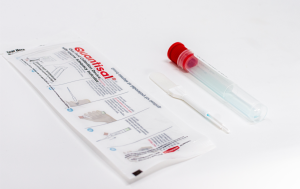
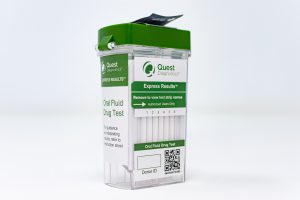
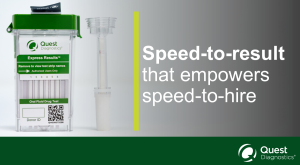
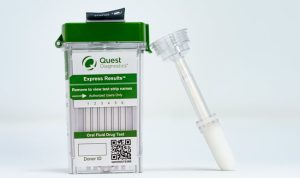




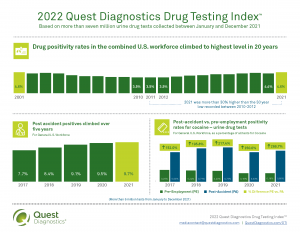










This article features highlights from an interview with Faye Caldwell, Esq. She is the managing partner at the Houston-based law firm of Caldwell Everson, PLLC., and one of the most respected legal experts on drug testing and cannabis laws. She is the past president of the Substance Abuse Program Administrators Association (SAPAA) (2019-20), a former member of the HHS Drug Testing Advisory Board (DTAB), and was appointed a member of the National Safety Council Alcohol and Drug Impairment Division (NSC ADID). She is a frequent speaker at conferences and webinars and has been published extensively.
Marijuana use across the country is increasing, according to an annual report from the federal government.[1] Private reports, such as the latest Quest Diagnostics Drug Testing Index™, show significant increases in marijuana-positive drug testing results across all major industries, including among workers in safety-sensitive categories where drug testing is mandated by the federal government.[2] Yet, employers are faced with many questions about what they can and, perhaps, cannot do to address the issue.
Quest Diagnostics Employer Solutions appreciates the challenges employers face, especially today as demand for workers continues to outstrip supply. Many employers have chosen to compromise the safety of their workplaces for quicker hiring solutions by not testing for marijuana or eliminating drug testing altogether. And for those who continue to screen their candidates and employees, many questions and uncertainties remain.
To add clarity and perspective to this important issue, Quest Diagnostics is pleased to present the following interview with Faye Caldwell, Esq.,[3] a leading legal expert on the subject of drug testing and cannabis laws.
In states that have legalized marijuana, do employers still have the right to prohibit employees from using marijuana on the job or being under the influence of marijuana while working? And if so, can an employer build those prohibitions into a policy regardless of their position on drug testing?
Faye Caldwell: Absolutely. And in fact, if you can’t take action against somebody following a positive drug test because that state provides legal protections, you can build a policy around the idea of informing employees that, yes we know that you have a right to legal off-duty use, but remember, you can’t use marijuana on the job and you can be fired for doing so. Employers should let employees know that they can’t come to work impaired. Many employers might not have a good concept of what rights they do have. Even if it may be difficult for the employer, particularly for impairment, to take action on a positive drug test, it should be an education point in a policy to help employees understand that they have some obligations as well.
The idea is that employers do not have to let anyone use cannabis on the job. That is a generality, but pretty well true. And they don’t have to let anyone work impaired. That is pretty much universal. That said, I always invite everyone to consult their own lawyer for their own state for their own job duties.
So, is it legal to test for marijuana?
Faye Caldwell: It is a complex question, but also a very narrow question. There is a difference between testing for cannabis and being able to use the results of testing for cannabis. Let’s break it down.
Can a test for cannabis actually be ordered? It depends on the type of testing being done. If it is federally mandated testing, DOT [Department of Transportation] or a federal agency, what I call federally regulated, you are not only able to test for cannabis, but you are also required to test for cannabis and take action based on a positive result.
For non-federally regulated testing it depends on where you are. Actually, it’s quite limited for where you cannot test for cannabis. Specifically at this moment, generally people who are employed in the state of New York or are going to be employed in the state of New York, absent from very minor exceptions, cannot be tested for cannabis. This is according to the state’s Department of Labor guidance that came out October 2021.
Additionally, there are some municipalities throughout the country that have placed restrictions on testing for cannabis on pre-employment screens only. Philadelphia has done that. So, we may see that generally limited to pre-employment testing, not random or post-accident.
Do you think some employers may be confused about whether they can test for cannabis because in their state there are restrictions on what they can do with the result?
Faye Caldwell: I think that some employers are confused about that. When I talk with employers, that’s generally the distinction. But what employers can do with a positive test result for marijuana depends on location and whether we’re talking about recreational cannabis or medical cannabis. We have to put those in two different buckets. Generally, in a number of states with legal medical marijuana, the test result alone cannot be used for what is called “adverse employment action.”
So, the issue comes down to looking at the state where the person is going to be employed, not the state where the employer is located. I will tell you that a lot of clients get confused about that. If the company is headquartered in Washington State, for example, it does not mean that all their employees in other states get legal use of cannabis. It depends on where the employee works. Then you have to look at the state law and see what restrictions it places on the workplace. In some places the answer is basically there is nothing you can do without [the employee being] impaired. New Jersey has just issued guidance on their recreational cannabis law and it’s something quite different than anywhere else. But it does severely restrict the ability of employers to take action on a positive cannabis test result. As such, for some employers it’s not just a question of where you can test, it’s often a question of is it worth testing at all.
What is a safety-sensitive carve-out in a marijuana law?
Faye Caldwell: This is where employees in certain safety-sensitive job positions may be subject to adverse employment action if they test positive for cannabis. We must point out that safety-sensitive does not mean the same thing across the nation. From state to state the definition of “safety-sensitive” can be very, very different. In some states, like my home state of Texas, you can pretty much do anything you want with a positive test result. Other states, you may get a question from an HR person of why you’re testing for cannabis at all.
Can employers justify a drug test based on some standard of reasonable suspicion they’ve established for their company, or do they need some other evidence to go along with it?
Faye Caldwell: Well as with many things, I am going to tell you the answer is a definite maybe. Because again it comes back to the location. Let’s take a couple of examples in a marijuana-friendly state. In Nevada, which is a marijuana-friendly state with what’s called an “off-duty” law that offers certain protections to people who use lawful products on their own time, the state Supreme Court quite surprisingly said that you can fire an employee who tests positive for cannabis. This means for current employees there is no protection. The state Supreme Court said because marijuana is federally illegal, an employer can conduct a drug test and take action based on a positive result. So that is kind of one extreme where a lot of people were a bit surprised by that ruling.
Let’s go to New York where you can test if there are observable, articulable symptoms of impairment or being under the influence. So, what is that? We all are used to the DOT standard of reasonable suspicion. Will that work? Well, it’s a good start to have supervisors document behavior that may be related to impairment. But employers must look at the state laws because the standard will vary. In some states the smell of cannabis might qualify as a sign of impairment, whereas in other states it would not.
At a minimum, I think a prudent employer would provide supervisor training on what impairment looks like in the workplace. Importantly, I will emphasize that the point is reasonable suspicion of drug use, and at the moment we see it, what appears to be impairment, but we don’t know what caused it. It could be drug use, it could be an adverse reaction to a medication, it could be a father with a newborn who hasn’t had any sleep in 72 hours. The goal should be to get that person off the job. Make a safe workplace. Get them the help they need. Do some investigation—with drug testing being one tool.
Does it make a difference what drug testing method an employer uses as it relates to marijuana?
Faye Caldwell: Yes. Let’s use recent legislation in California as an example in answering that question. California correctly recognizes that most workplace drug testing for marijuana focuses on identifying a metabolite of a drug. That would be urine and hair. Now, these testing methods are fabulous, and there are scientific reasons why that’s so. But they correctly identify marijuana metabolites, not the parent drug. But the presence of a metabolite does not mean the drug is active in the system. It is evidence that it has passed through a person’s body and resides there which would indicate previous usage.
Hair testing, for example, identifies a pattern of repetitive use. If you use an inch and a half of head hair, you’re looking at a 90-day look-back. Which has always been useful to employers at identifying lifestyle marijuana usage. Now is that relevant in light of some of the cannabis laws? Same thing with urine. Both methods are testing for metabolites. What California has said is, starting in January 2024, an employer can test for marijuana, but they cannot use a method that looks for metabolites. So, an employer would not be allowed to take action, absent some safety-sensitive carve-outs that are in the new regulation. This may effectively limit the utility of hair or urine testing in that state.
{Editor’s Note: Quest Employer Solutions offers a variety of drug testing options, including lab-based and rapid-result oral fluid testing, which is capable of identifying the parent drug starting within about 15 minutes of usage.]
Where there may be restrictions on what an employer can do with a positive test result, is there ongoing value in conducting drug testing?
Faye Caldwell: None of what we are talking about impacts drug testing, with the exception of cannabis. Employers can still be testing for cocaine, for example. These restrictions on testing for cannabis or acting on a positive result for cannabis are not throwing out drug testing in general. All other drug testing is unaffected by this recent flurry of cannabis issues.
We are still seeing positives for cocaine, methamphetamine, etc, and these are increasing. Opioid use continues to increase. And a drug that I’m very concerned about, frankly, and we don’t see it very much in the drug testing literature, but I think we will soon, is the rising use of fentanyl.
It bears repeating that on the subject of cannabis usage, states that legalize it recreationally—not so much in the case of medical marijuana—see a huge increase in positive workplace drug test results. It’s not surprising that we’re seeing some large-fold increases, year over year, when states legalize cannabis. The Quest Drug Testing Index demonstrates that.4 And the trends are growing. How much? There’s a lot of variation. There may be a satiation point, but we’re not there yet.
After all is said and done, what is the utility of drug testing in the age of legal marijuana?
Faye Caldwell: I’m a lawyer, so the first thing I’m going to tell an employer is you have to comply with the law. They should not be testing for cannabis where it’s not legally authorized, otherwise they’re just asking for litigation. Then you have to answer the question about what your employees do. Do they sit behind desks all day and don’t really interact with the populace? Or do they climb up on cranes? Do they work in the oil and gas industry? Each company has to weigh safety risks against litigation risks, and we know that marijuana is impairing. Each company must define as a policy where they want to go. First off whether to test. Second whether to take action based on positive results.
The majority of states that have legalized marijuana have done so for medical use; we’re not yet to a majority of states having legalized recreational marijuana, and even fewer have provided employee protections. In the states where recreational marijuana is not legal yet, generally you can take action on a positive drug test result. So, we’re really talking about a minority of states facing challenges with cannabis drug testing. It’s a trend, but it’s not an overwhelming trend. But remember in the vast bulk of this nation you can still test for cannabis, and you can still take action on positive results.
Conclusion
Clearly, the issue of legal marijuana and its impact on the workplace is complicated. It demands a thoughtful review of a company’s drug testing objectives within the scope of the type of work its employees perform. Of paramount importance: a thorough review of all applicable state laws. Each state where a company has operations may have a different marijuana law, and compliance with each is required.
Quest Diagnostics works as a consultative partner for accurate, accessible drug testing solutions across a full range of testing requirements. Quest brings real-world expertise, unmatched science, and stringent processes to deliver programs that optimize your candidate experience, help you keep pace with today’s speed of hiring, and reduce workplace risk.
The opinions expressed here are those of the individual interviewed and do not necessarily reflect those of Quest Diagnostics. This content is not intended as legal advice; always consult a legal advisor when establishing pre-employment, random, post-accident, return-to-work, or other drug testing policy.
[1] National Survey on Drug Use and Health. SAMHSA. October 2021. Page 14. https://www.samhsa.gov/data/sites/default/files/reports/rpt35325/NSDUHFFRPDFWHTMLFiles2020/2020NSDUHFFR1PDFW102121.pdf
[2] Workforce Drug Test Positivity Climbs to Highest Level in Two Decades, Finds Quest Diagnostics Drug Testing Index Analysis. Quest Diagnostics Drug Testing Index.
[3] D. Faye Caldwell, Esq., Bio. https://caldwelleverson.com/partners/caldwell.html
4 2022 Annual Report and Industry Insights. Drug Testing Index™ and Industry Insights. Page 3. https://filecache.mediaroom.com/mr5mr_questdiagnostics/203415/quest_drug_testing_index_2022.pdf